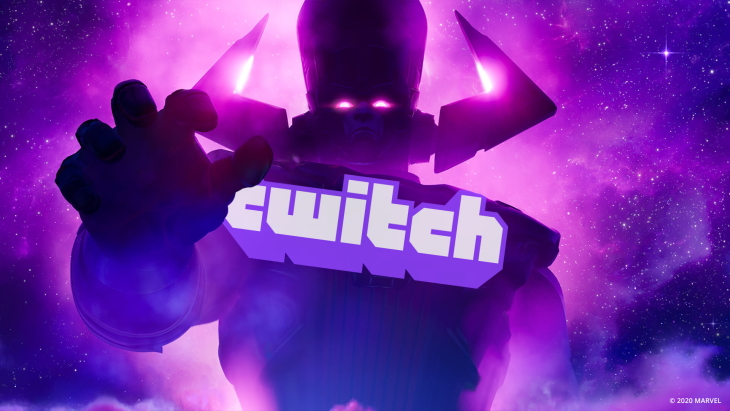
Twitch have once again upset users, asking them to delete VODs and Clips they made from the Fortnite Nexus War event to avoid DMCA strikes.
The event (which you can view here via GamesRadar) features Marvel super heroes and the player teaming up to take down planet-eating menace Galactus. It also features the AC/DC song Demon Fire (at 7:54 in the video), and likely the cause of any possible DMCA claims from uploading or streaming the event.
Epic Games had previously informed content creators that via various partnerships that they would be able to “host VOD content from the Galactus event on YouTube and be able to monetize on those videos” for 90 days. “Following the 90 days,” Epic Games warned, “Creators should not receive takedown notifications, but their videos will be demonetized.”
Twitch seemingly did not have a similar partnership. Twitch support tweeted on December 1st “If you streamed the Fortnite Nexus War event, and you want to be cautious about DMCA risk from the music in that event, consider exporting/downloading and then deleting any related VODs or Clips.”
Users were infuriated by the response; feeling as though Twitch was making them choose between keeping the VOD of a major event in a very popular game, or risk a DMCA strike. Others claimed there had been cases of users getting DMCA strikes on videos that had already been removed.
This is not the first time Twitch has upset users by seeming taking the side of those making DMCA claims over their own users.
On November 11th of this year, Twitch recommended users not play copywritten music during their streams, after a large surge of DMCA claims and purging thousands of videos without warning. They also recommended users should review their VODs of older streams and Clips, and delete any that contain such music. Many felt this response was insulting.
While Epic Games had stated no VODs of the event would be taken down (but could no longer be monetized), it seems that this only applies to platforms such as YouTube. That platform is typically capable of demonetizing videos, or directing money earned from the video to the party making a DMCA strike.
It may be possible Twitch is erring on the side of caution, as there have been reports of individuals on multiple streaming platforms having DMCA claims from parties who did not own the content, or false positives brought about by automated bots. It may also be possible that Twitch cannot disable monetization- such as adverts- for themselves or content creators even within VODs and Clips.
Image: Epic Games, Wikipedia